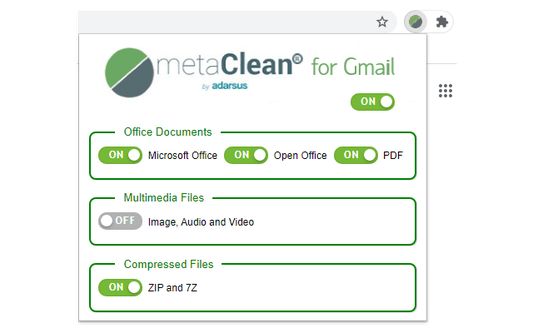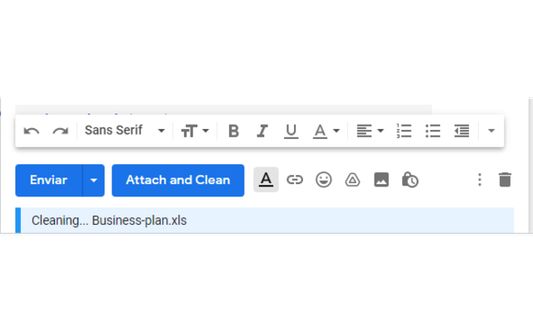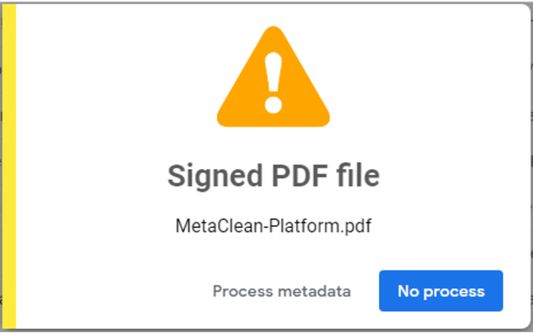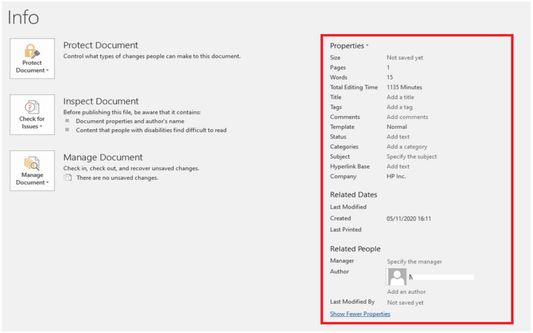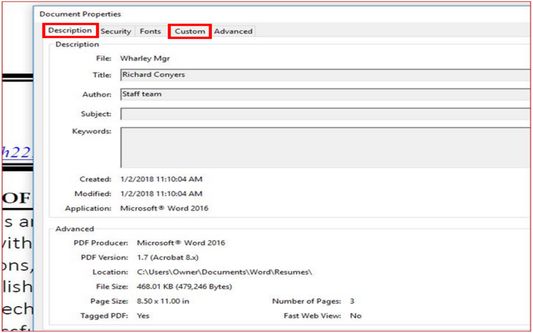Removes metadata and hidden data in email attachments preventing the leakage of confidential information that occurs in this type of communication and avoiding possible economic and reputational damages derived from the malicious use of metadata.
MetaClean for Gmail - Remove Metadata from Email Attachments
MetaClean for Gmail is a Firefox add-on that removes metadata and hidden data in email attachments. It prevents the leakage of confidential information and protects against potential economic and reputational damages. With its ease of use and no user registration required, it automatically processes attachments to ensure they are free of metadata. Supported file formats include Microsoft Office, PDF, RTF, and more. For enterprise use, it offers customizable metadata templates. Get rid of harmful forms of metadata with MetaClean for Gmail.
Add-on stats
Rating: 5.00 
(2)
Creation date: 2022-03-21
Weekly download count: 1
Firefox on Android: No
Risk impact: Moderate risk impact 
Risk likelihood:
Manifest version: 2
Permissions:
- storage
- https://mail.google.com/
- https://www.metaclean.es/*
Size: 240.69K
Email: su*****@adarsus.com
URLs: Website
Ranking
Want to check extension ranking and stats more quickly for other Firefox add-ons?
Install
Chrome-Stats extension
to view Firefox-Stats data as you browse the Firefox Browser Add-ons.
Add-on summary
Why should you use MetaClean for Gmail?
- Data Breach Prevention: Every document contains metadata. For example, metadata is embedded in the file and is different to the information that is typed on the page – such as Author, track changes or comments. It can tell the reader who created the document, how long was spent editing it, and where the document is saved. Cleaning a document of metadata means that the recipient will only be sent what would be printed. Removing potentially harmful forms of metadata from the attached files is a risk area that should be considered when investigating ways to prevent email-related data leaks.
- Phishing Attack Prevention: MetaClean prevents the exfiltration of information through metadata which is commonly used to generate phishing attacks.
- Ease of use and there is no user registration required: Just install and enjoy it!
- This extension automatically processes the document's metadata when it is attached, you don't need to take any additional action, ensuring that the attachments you send are free of metadata and personal information.
- It allows you to quickly and intuitively select the types of files to process (see screenshot).
- It shows information of interest to the user, for example when a PDF file is digitally signed.
- FREE for personal use.
- Removes metadata from all versions of Microsoft Office, Open/Libre Office, PDF, RTF and Image, Audio and Video files. (See the list of supported file formats at: https://www.adarsus.com/en/file-formats-compatible-with-metaclean/)
- Supports ZIP and 7Z files: compressed documents will be processed by MetaClean.
- Detection of signed PDF files: To avoid invalidation of the signature, a warning will be displayed indicating whether you want to process the metadata of the signed PDF file (see screenshot).
- Displays a warning when attaching Microsoft Office files with change control and/or comments enabled.
- Delete hidden data such as: Printer routes, history of document changes, etc.
- For free version, the tag "Metadata removed by MetaClean (www.adarsus.com)" will be added to the keyword metadata in processed documents.
- Creation of metadata templates to remove, add or modify standard and customized metadata tags.
- The text: "Metadata removed by MetaClean (www.adarsus.com)" will be removed from the metadata tag: keyword.
How to view PDF document metadata? Open the concerned PDF document in Adobe Acrobat and go to File > Properties > Description and Custom tabs. It will show you a window that consists of different components of the metadata of the concerned PDF document.
How to view Microsoft Word/Excel/PowerPoint document metadata? Open the Word/Excel/PowerPoint document and go to "File" menu. Click "Info" and then click "Show all Properties" to view the metadata entries for the document.
User reviews
by Andreas, 2024-03-27
by Andreas, 2024-03-27
Easy to use and very fast.
Highly recommended.
by Firefox user 17378340, 2022-04-17
Add-on safety
Risk impact

MetaClean for Gmail requires a few sensitive permissions. Exercise caution before installing.
Risk likelihood

MetaClean for Gmail has earned a fairly good reputation and likely can be trusted.
Upgrade to see risk analysis details
